The benefits of marketing automation for small businesses are becoming increasingly apparent in today’s fast-paced digital landscape. As companies strive to connect with their target audience effectively, marketing automation presents a game-changing solution that streamlines various processes while enhancing customer engagement and return on investment.
Increased Efficiency Through Marketing Automation
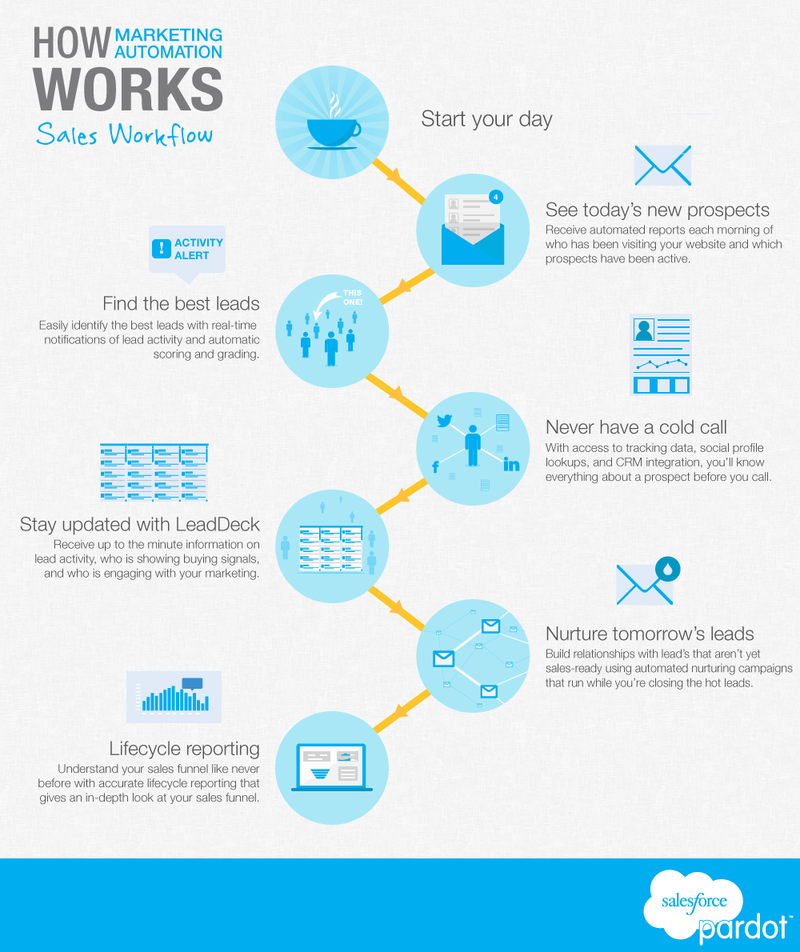
Marketing automation is heralded for its ability to significantly increase efficiency within small business operations. By automating mundane tasks that typically consume time and resources, businesses can focus their efforts on strategy and creativity.
Task Automation: Freeing Up Valuable Time
One of the primary advantages of marketing automation is its capacity to handle repetitive tasks. From email marketing campaigns to social media postings, automation tools can schedule and execute these tasks seamlessly. This not only saves time but also reduces the risk of human error—ensuring that messages reach customers at the right moment without manual intervention.
With an automated system in place, marketers can dedicate more time to high-level activities such as crafting compelling content, analyzing market trends, or exploring new opportunities for growth. The potential for increased productivity subsequently amplifies the effectiveness of marketing strategies, enabling small businesses to achieve their goals more efficiently.
Centralized Management for Cohesive Strategies
Marketing automation platforms allow for centralized management of marketing efforts across multiple channels. In the past, businesses often operated in silos, managing their email, social media, and website analytics independently. However, with marketing automation, all these elements can be integrated into a single interface.
This centralization facilitates better collaboration among team members and ensures a cohesive approach to branding and messaging. When every piece of content aligns with overarching business objectives, it creates a more powerful impact on the target audience, thereby enhancing the overall effectiveness of marketing campaigns.
Data-Driven Decisions with Automation Insights
Marketing automation tools gather valuable data regarding customer interactions and behaviors. This data analysis provides insights that are essential for refining marketing efforts.
By understanding what resonates with their audience, small businesses can tailor their strategies to enhance engagement and conversion rates. For instance, knowing which emails have higher open rates or which social media posts garner the most interaction allows businesses to replicate successful tactics and abandon less effective ones.
In summary, the benefits of marketing automation for small businesses lie in its ability to increase efficiency by streamlining tasks, centralizing management, and providing actionable insights—all of which contribute to smarter decision-making.
Get the full breakdown of the top marketing automation tools and their benefits here.
Cost-Effectiveness of Marketing Automation for Small Enterprises

For small businesses operating with tight budgets, cost-effectiveness is crucial when considering marketing strategies. Marketing automation represents a financially sensible option as it eliminates many traditional marketing expenses.
Reducing Labor Costs
One of the most significant financial advantages of marketing automation is the reduction in labor costs. With tasks like lead nurturing, follow-up emails, and social media monitoring automated, fewer personnel are needed to manage these functions.
Small businesses can allocate their limited resources more efficiently, focusing on areas that generate the highest returns. Instead of hiring additional staff for marketing roles, a small business can invest in a comprehensive marketing automation tool that provides the same—or even greater—capabilities.
Learn more: What is Marketing Automation? Boost Your Business Efficiency with Automated Strategies
Minimizing Marketing Waste
Traditional marketing methods often lead to wasteful spending on campaigns that yield minimal results. Fortunately, marketing automation enables businesses to segment their audience effectively and target them with personalized content.
This precision reduces wasted advertising spend and maximizes return on investment. Instead of broadcasting a generic message to everyone, you can send tailored communications that resonate with specific segments. The result is a more efficient use of marketing budgets, leading to higher conversion rates and better customer retention.
Affordable Solutions for All Business Sizes
Many marketing automation platforms cater specifically to small businesses, offering tiered pricing plans that align with varying budgets. Whether your business is just starting out or looking to scale, there are affordable solutions available that provide robust features without breaking the bank.
With a range of options from simple email marketing tools to comprehensive CRM-driven platforms, small businesses can choose the level of service that best fits their needs. This flexibility empowers organizations to adopt automation at a pace that suits their operational structure and financial capability.
In conclusion, the benefits of marketing automation for small businesses extend well beyond convenience; they encompass substantial cost savings through reduced labor costs, minimized marketing waste, and affordable solutions tailored to different budget levels.
Get Now: Unlock 300+ Proven Ways to Make Money With GPT – Your Shortcut to Financial Freedom!
Enhancing Customer Engagement with Automated Campaigns
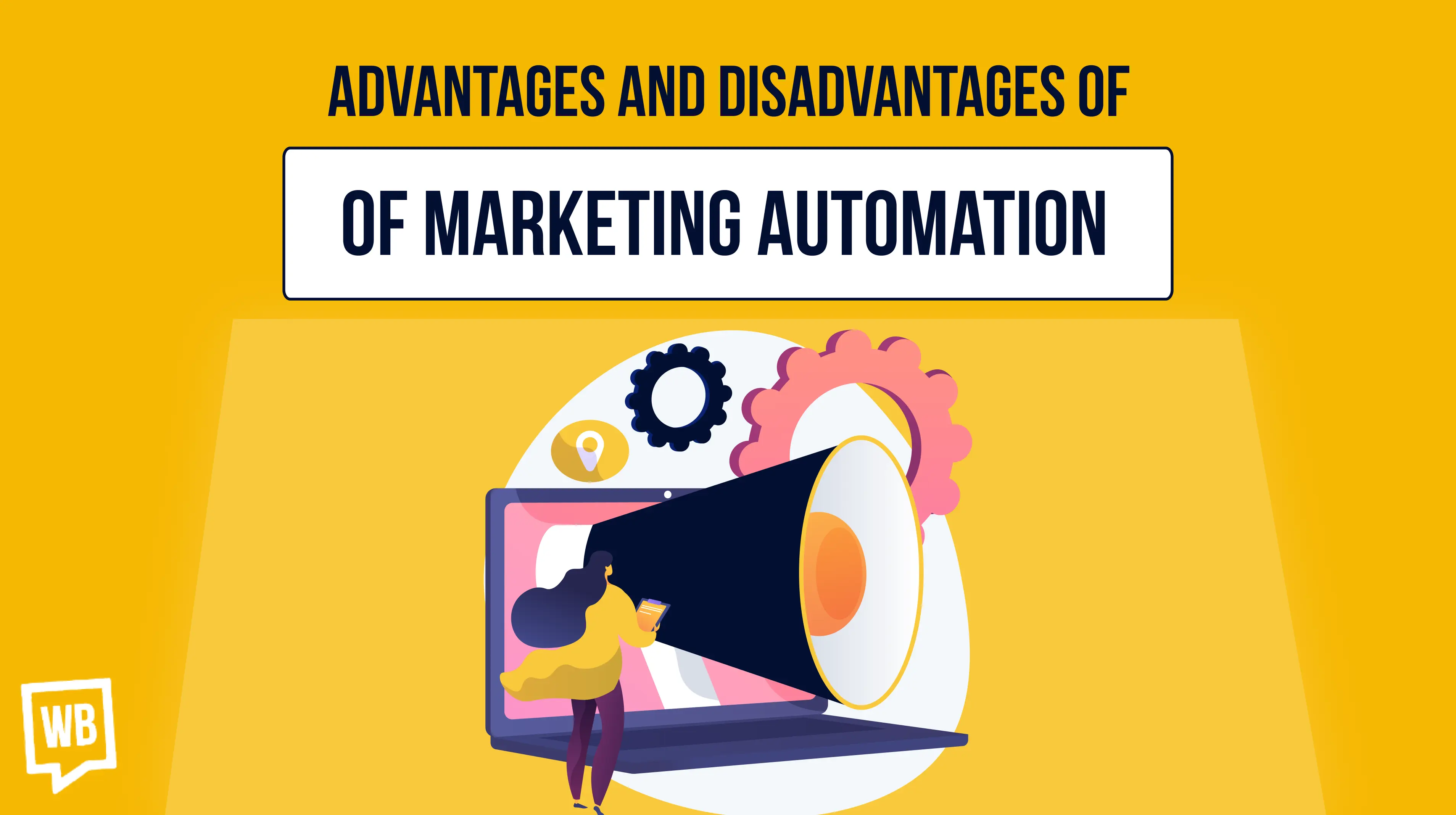
Another significant advantage of marketing automation is its ability to enhance customer engagement. By leveraging automated campaigns, businesses can create meaningful connections with their audience, improving loyalty and fostering long-term relationships.
Personalized Communication: The Key to Engagement
Personalization has become a cornerstone of effective marketing strategies. Automated campaigns allow businesses to send highly targeted messages based on user behavior, preferences, and demographics.
When a customer receives a message tailored to their interests, they are much more likely to engage. Marketing automation enables businesses to track user journeys and deliver relevant content at each touchpoint, increasing the chances of customer interaction.
Whether it’s prompting a user who abandoned their shopping cart or sending personalized product recommendations, automation facilitates timely and impactful communication that resonates with the customer on a personal level.
Learn more: How to Choose the Right Marketing Automation Tool
Omnichannel Marketing for Consistent Experiences
Today’s consumers interact with brands across multiple channels—social media, email, websites, and more. Marketing automation supports omnichannel marketing strategies by ensuring consistent messaging across all platforms.
With automation, businesses can synchronize campaigns to reach customers wherever they are. By maintaining a unified brand voice and experience, companies can build trust and credibility with their audience. This consistency enhances customer satisfaction, making it more likely that customers will return for future purchases.
Timely Responses and Improved Interaction Rates
Automated campaigns can streamline customer interactions by providing timely responses. For example, if a customer submits an inquiry via a contact form, automated systems can acknowledge receipt immediately and provide estimated response times.
Additionally, chatbots powered by automation can address frequently asked questions in real-time, offering instant support and improving the overall customer experience. Ultimately, these timely interactions foster positive sentiments toward the brand and encourage deeper engagement.
In summary, the benefits of marketing automation for small businesses are evident in its capacity to enhance customer engagement through personalized communication, omnichannel marketing, and timely responses, thereby creating lasting relationships that drive loyalty and advocacy.
Get Now: The Faceless Marketing Masterclass – Build a Powerful Online Brand Without Ever Showing Your Face
Lead Generation Made Easy with Marketing Automation
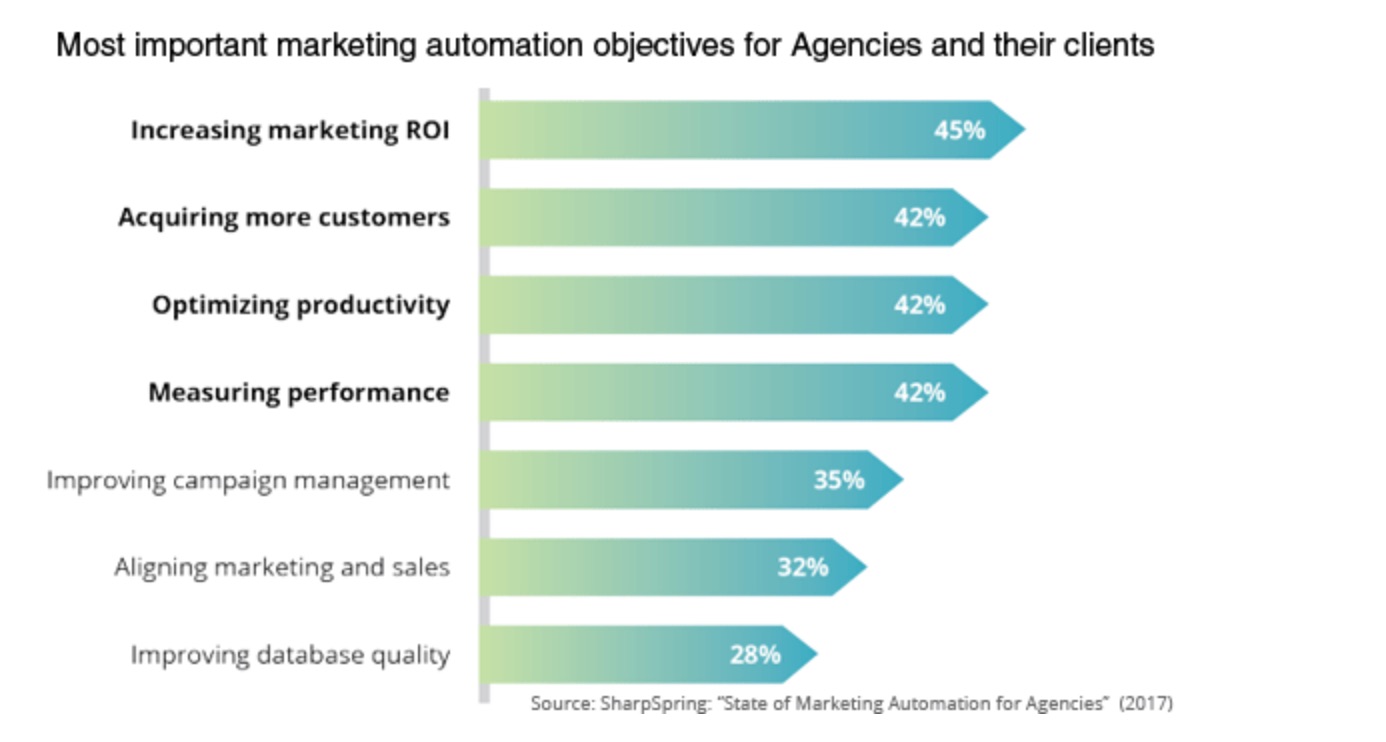
Generating leads is a fundamental aspect of any successful marketing strategy, and marketing automation simplifies this process for small businesses. By employing sophisticated tools designed to nurture and engage potential customers, companies can effectively drive leads into their sales funnel.
Streamlined Lead Nurturing Processes
Marketing automation allows businesses to create streamlined lead nurturing processes that guide prospects through the buying journey. By using automated workflows, businesses can send a series of targeted emails to educate potential customers about their products or services.
These workflows can be set to trigger based on specific actions taken by the lead, such as downloading a resource or attending a webinar. By continually delivering relevant information, businesses can build relationships and position themselves as trusted authorities in their industry.
Learn more: Free Marketing Automation Tools vs Paid Solutions
Capturing Leads Through Effective Landing Pages
Creating optimized landing pages is critical for capturing leads, and marketing automation offers tools that facilitate this process. Many platforms provide templates and customizable options that help businesses create engaging landing pages quickly.
With integrated forms and calls-to-action, businesses can easily collect contact information from interested visitors. Once captured, this information becomes part of the lead nurturing process, allowing automated campaigns to follow up and convert leads into paying customers.
Scoring and Qualifying Leads Automatically
Lead scoring is another invaluable feature of marketing automation, enabling businesses to assess the quality of their leads automatically. By assigning scores based on specific criteria—such as engagement levels, interests, and demographic information—businesses can prioritize leads that exhibit the highest likelihood of conversion.
This automated qualification process frees up valuable time for sales teams, allowing them to focus on high-potential leads rather than sifting through unqualified inquiries. The result is a more efficient sales process and improved conversion rates.
To summarize, the benefits of marketing automation for small businesses shine through in lead generation strategies, where streamlined nurturing processes, effective landing pages, and automated lead scoring work together to create a robust pipeline of qualified leads ready for conversion.
Learn more: Challenges of Marketing Automation and How to Overcome Them
Improving Marketing ROI with Automation Tools
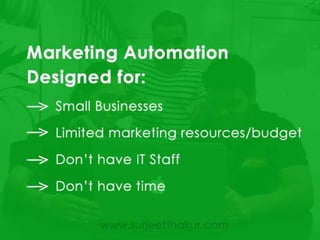
Achieving a high return on investment (ROI) is a top priority for any marketing strategy, and marketing automation plays a significant role in improving this metric for small businesses. By utilizing advanced tools and analytics, companies can make informed decisions that lead to enhanced performance.
Tracking Performance with Real-Time Analytics
One of the standout features of marketing automation is its ability to track campaign performance in real-time. Business owners have access to detailed analytics that reveal how each marketing effort is performing, including metrics such as open rates, click-through rates, and conversions.
This immediate feedback loop allows businesses to make quick adjustments to their strategies based on what is working and what isn’t. With continuous optimization, companies can refine their messaging and allocate resources more effectively, ultimately maximizing their marketing ROI.
Read more:
- Systeme.io Review: The Ultimate All-in-One Marketing Tool for Entrepreneurs
- GetResponse Review: In-Depth Analysis of Features, Pricing, and Performance
Testing and Experimentation for Better Results
A/B testing—which involves comparing two variations of a marketing element to determine which performs better—is made easier with marketing automation. Small businesses can experiment with different subject lines, images, and calls-to-action to identify the most effective combinations.
Through automated testing, businesses can gather data on customer preferences and behaviors, leading to improved messaging over time. With a culture of experimentation supported by automation, companies can continuously enhance their campaigns and drive better results.
Long-Term Impact of Improved ROI
Increasing marketing ROI has a compounding effect on a business’s success. When small enterprises see higher returns on their marketing investments, they can reinvest those profits back into their strategies.
This cycle of improvement paves the way for continued growth and innovation, allowing businesses to explore new markets or expand their product offerings. Over time, a strong ROI can elevate a small business’s competitive edge and sustainability in the market.
In essence, the benefits of marketing automation for small businesses directly correlate with improved marketing ROI through the utilization of real-time analytics, A/B testing capabilities, and the long-term impact of maximizing returns on investment.
Streamlining Social Media Management via Automation

Social media is an indispensable component of modern marketing, particularly for small businesses aiming to connect with their audiences. Marketing automation offers solutions that simplify social media management, making it easier to maintain a consistent online presence.
Scheduling Posts for Consistency
One of the simplest yet most effective ways to streamline social media management is through post scheduling. Marketing automation tools allow businesses to plan and automate their social media posts in advance.
By curating content calendars and setting specific posting times, businesses ensure they remain active across platforms without the need for constant manual monitoring. This consistency helps build brand awareness and keeps followers engaged, ultimately driving traffic to their website and increasing conversions.
Engaging Audiences with Automated Responses
Maintaining interaction with followers is crucial, and marketing automation enables businesses to set up automated responses to comments or messages. These immediate acknowledgments create a welcoming environment for potential customers and encourage further dialogue.
Furthermore, automation tools can analyze trending topics and engage users with relevant content, helping to foster community and keep the audience informed. This proactive approach to social media engagement nurtures relationships and enhances brand reputation.
Analyzing Social Media Metrics for Strategy Optimization
Monitoring social media performance is essential for refining strategies, and marketing automation provides valuable insights into audience engagement metrics. Businesses can track likes, shares, comments, and follower growth to gauge their performance over time.
By analyzing these metrics, businesses can identify trends and adjust their content strategy accordingly. If certain types of posts generate higher engagement, companies can focus their efforts on replicating that success.
In conclusion, the benefits of marketing automation for small businesses extend to social media management, where scheduling, automated engagement, and performance analysis combine to create a strong online presence and maximize audience interaction.
Personalization in Marketing Automation: A Game Changer

Personalization is a buzzword in marketing, and for good reason. It has been proven to boost customer engagement and drive sales, and marketing automation makes achieving personalization scalable and efficient.
Understanding Customers Through Segmentation
At the heart of effective personalization is segmentation—dividing your audience into distinct groups based on shared characteristics. Marketing automation tools excel at this task, allowing businesses to categorize leads and customers according to various demographics, behaviors, and interests.
By understanding the unique needs of each segment, businesses can tailor their marketing messages and offers to resonate with their audience. This targeted approach leads to higher open rates, click-through rates, and, ultimately, conversions.
Dynamic Content for Tailored Experiences
Dynamic content refers to web content that changes based on the viewer’s profile data or behavior. Marketing automation allows businesses to harness dynamic content in email campaigns, landing pages, and website experiences.
For example, businesses can send an email featuring product recommendations based on past purchases. Similarly, a visitor arriving on a site may see personalized greetings or offers catered specifically to their interests. This level of customization improves user experience and fosters stronger connections between the brand and consumer.
Building Loyalty Through Relevant Interactions
Personalization goes beyond initial engagement; it plays a crucial role in building long-term customer loyalty. When businesses consistently deliver relevant content and experiences, customers feel valued and understood.
Over time, this connection encourages repeat purchases and referrals, as satisfied customers are more likely to advocate for the brand. Marketing automation supports ongoing engagement initiatives that nurture these relationships, reminding customers of their importance to the business.
In summary, the benefits of marketing automation for small businesses manifest in the realm of personalization, where segmentation, dynamic content, and relevant interactions work together to create memorable customer experiences that foster loyalty and advocacy.
Time Savings for Small Business Owners Using Automation
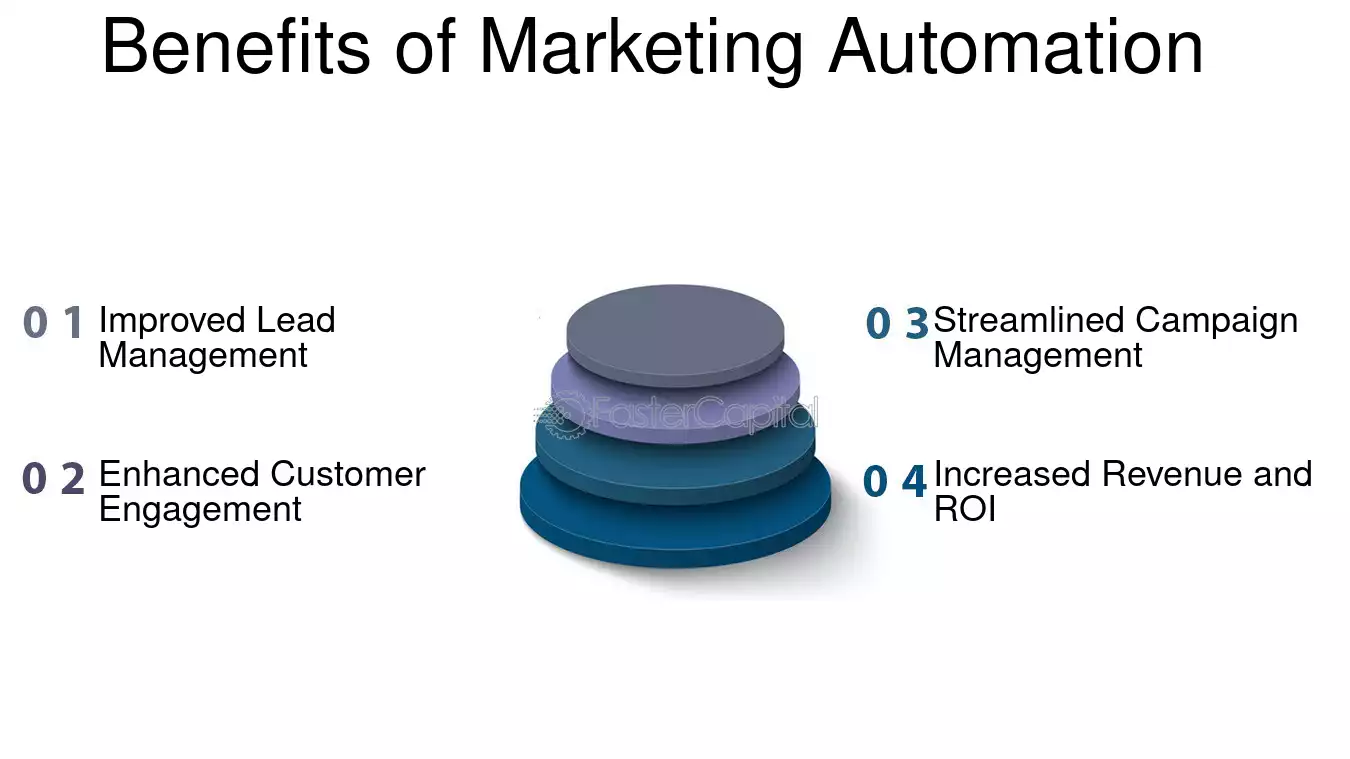
Time is one of the most precious resources for small business owners, and marketing automation is designed to save time while still delivering impactful marketing efforts.
Delegating Tasks to Automation Systems
By implementing marketing automation tools, small business owners can effectively delegate routine marketing tasks to automated systems. This allows them to focus on core aspects of their business, such as product development, customer service, and strategic planning.
For instance, instead of spending hours drafting and sending email campaigns manually, automation allows for the creation of templates and pre-scheduled sends. This delegation not only saves time but also enables business owners to maintain a well-organized marketing calendar.
Immediate Access to Information and Updates
Marketing automation platforms provide immediate access to key information and updates about campaigns and performance metrics. Rather than sifting through endless spreadsheets or reports, business owners can visualize data in real-time dashboards.
This access allows for quicker decision-making and responsiveness to market shifts. Additionally, automation solutions can alert owners to important events—such as when a campaign reaches certain milestones—keeping them informed without added workload.
Fostering a Balance Between Work and Life
By reducing the time required to manage marketing tasks, automation contributes to a healthier work-life balance for small business owners. The ability to step away from daily marketing responsibilities not only alleviates stress but also empowers owners to devote more time to family, hobbies, and self-care.
Ultimately, the time savings delivered by marketing automation fosters a more sustainable approach to running a small business, allowing owners to grow their operations without sacrificing personal well-being.
In essence, the benefits of marketing automation for small businesses are clear when examining time savings, where automation elevates efficiency through task delegation, immediate access to vital information, and a balanced lifestyle for owners.
Analytics and Insights: Leveraging Data through Automation
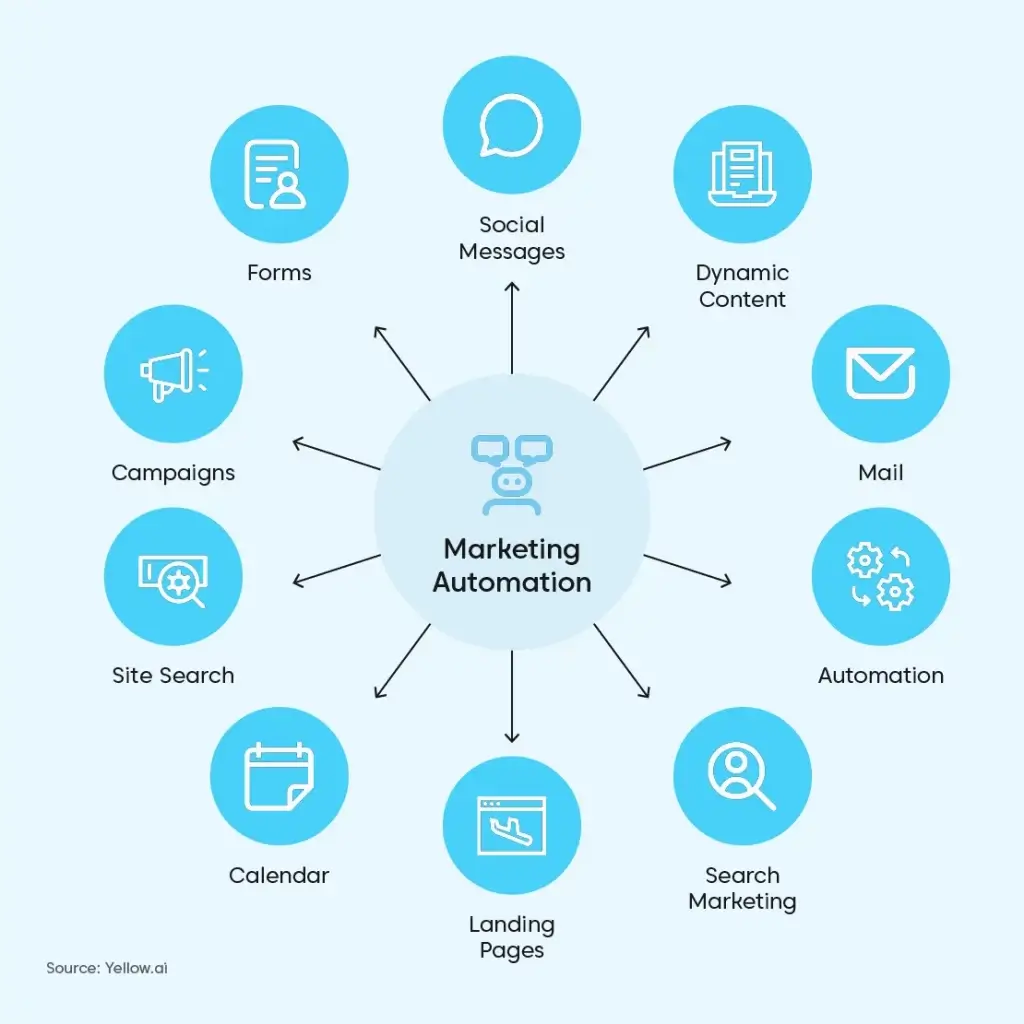
Data-driven marketing is no longer optional; it’s essential for small businesses striving to compete in today’s landscape. Marketing automation provides access to analytics and insights that empower better decision-making.
Comprehensive Data Collection Across Touchpoints
Marketing automation tools offer comprehensive data collection capabilities, allowing businesses to track customer interactions across multiple touchpoints. This data includes everything from email opens to website visits and social media engagements, providing a holistic view of the customer journey.
Such extensive data collection helps businesses identify patterns, preferences, and pain points among their audience. By leveraging these insights, small businesses can refine their marketing strategies to address customer needs more effectively.
Actionable Insights for Continuous Improvement
Beyond data collection, marketing automation converts raw data into actionable insights. These insights reveal what strategies are working and which areas require adjustments.
For example, if analytics show high engagement rates for specific types of content, businesses can double down on those efforts, creating similar material to capitalize on audience interest. Conversely, low-performing campaigns can be re-evaluated and optimized to improve results.
Predicting Future Trends for Strategic Planning
Advanced marketing automation platforms incorporate predictive analytics, helping businesses anticipate future trends and customer behaviors. By analyzing historical data, businesses can forecast potential outcomes and make strategic decisions that align with projected market demands.
This foresight enables small businesses to stay ahead of the competition by launching targeted campaigns before trends fully emerge. As a result, they can position themselves as thought leaders and innovators within their industry.
In conclusion, the benefits of marketing automation for small businesses include unparalleled access to analytics and insights that drive data-driven decision-making, continuous improvement, and strategic planning for future success.
Scalability: Growing Your Business with Automated Marketing Solutions
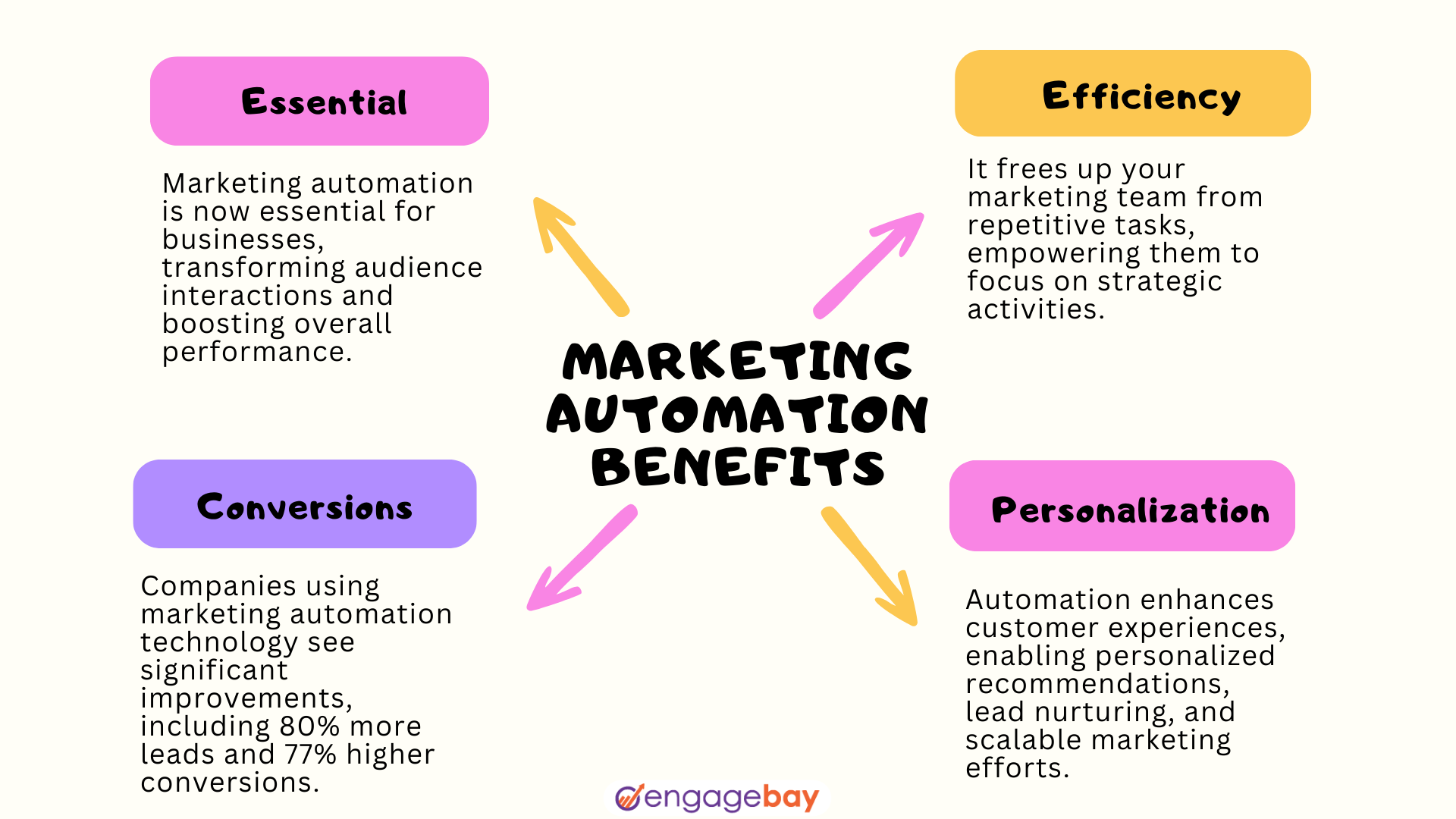
Scalability is a crucial consideration for small businesses aiming for growth. Marketing automation offers the scalability necessary to adapt and evolve as business needs change.
Flexibility to Scale Operations Effortlessly
As a business grows, so do its marketing requirements. Marketing automation solutions provide the flexibility to scale operations effortlessly—whether that means increasing the volume of campaigns or expanding into new markets.
Automation platforms allow businesses to add new features, integrations, and functionalities as needed, without requiring a complete overhaul of existing systems. This adaptability ensures that businesses can respond to new opportunities without experiencing disruption.
Supporting Expansion Without Proportional Increases in Costs
One of the remarkable aspects of marketing automation is its ability to support expansion without proportional increases in costs. Unlike traditional marketing approaches that often require additional human resources as operations grow, automation allows businesses to manage larger volumes of marketing activities with minimal incremental investment.
This efficiency means that small businesses can pursue growth strategies confidently, knowing that they can maintain marketing effectiveness regardless of size.
Sustaining Growth with Data-Driven Strategies
Data collected through marketing automation tools supports sustainable growth. As businesses scale, they can rely on insights derived from data analytics to inform their strategies.
By continuously optimizing campaigns based on performance metrics, businesses can ensure that they are investing their resources wisely. This data-driven approach minimizes risks associated with growth, allowing small enterprises to expand strategically.
In essence, the benefits of marketing automation for small businesses revolve around scalability, where flexible solutions enable effortless growth, support expansion without inflated costs, and sustain success through data-driven strategies.
Conclusion

The benefits of marketing automation for small businesses are profound and far-reaching. From increased efficiency and cost-effectiveness to enhanced customer engagement and improved marketing ROI, automation serves as a pivotal tool in navigating the complexities of today’s digital landscape.
As small businesses continue to seek innovative ways to connect with their audience and optimize their operations, marketing automation emerges as a critical ally in achieving these goals. Investing in automation not only streamlines processes but also fosters personalization, drives lead generation, and unlocks valuable insights that pave the way for sustained growth.
Ultimately, embracing marketing automation empowers small businesses to thrive in an increasingly competitive marketplace, ensuring they remain agile, responsive, and poised for long-term success.


Leave a Reply